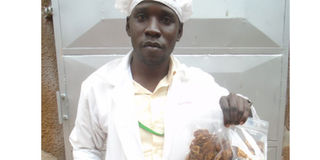Plantains: Do away with middlemen

Jeff Obong displays ripen plantain (Left) before value addition and plantain crisps (Right hand) after value addition process. Obong and other farmers have since eliminated the middlemen hence earning more from their gardens. Photo by Fred Muzale
Plantain is a type of banana often eaten while roasted. It is similarly sliced into crisps and deep fried to make plantain gonja crisps.
Additionally, in some few cases, it is consumed when boiled or steamed. All these are forms of adding value to the sweet plantain.
Amos Tusubira has been growing plantain for the last five years. His farm is based in Rakai District.
“In the beginning I would get little from my plantains. I was selling them to middlemen from Kampala. I was being paid Shs5,000 for each bunch,” explains Tusubira.
On average, Tusubira would harvest more than 50 bunches per month earning about Shs250,000 after selling to middlemen.
Value addition
Tusubira’s fortunes changed when officials from Kamuswaga the cultural leader of Kooki connected him to Uganda Industrial Research Institute (UIRI). He says after attending workshops on value addition, he decided to give it a try.
“I bought a processing unit from Kampala and installed it in Rakai. I make plantain crisps and package them. I distribute to major towns in central Buganda,” he says.
From the same 50 bunches, Tusubira today earns more than Shs5m after operational costs.
“The middleman is no more and I am earning better,” he says.
Jeff Odong is another farmer cum businessman earning good money by adding value to plantains.
Odong who is the quality control officer at Jakana Fruits Ltd, says solar dried gonja, has a big export market abroad, than many fruits grown in Uganda.
“Very few people are aware that the demand for dried gonja is very high, especially on the export market. By roasting or deep frying gonja to make crisps, one increases its sale value but drying it further makes it more marketable,” Odong says.
Odong says he buys plantains from Rubirizi District in western Uganda. Here he says they have organically certified farmers, from whom they buy the gonja.
“The organically certified farmers we buy from, don’t use chemicals like insecticides, fertilisers or herbicides in their gardens,” Odong says.
The process
Plantains are ferried to the factory in trucks and when it reaches the factory it is put into the ripening store.
It takes between 3-4 days to ripen. When it ripens, it is washed and the skin is peeled off. It is then cut into small equal pieces. The crisps are placed on trays and put into a solar drier. After two days, depending on the weather, the crisps are dry and ready for packaging. Odong says, when dry, the gonja crisps have 5 per cent moisture content.
However, he says, they can dry it depending on the desires of their customers. In a month, they produce an average of 700 kilogrammes of the dry fruit and earn about Shs25m. When all the expenses are deducted, they remain with a profit of about Shs15m a month.
“Our revenue is still small given that we are still producing below capacity. This is because we don’t have enough gonja as there are still few farmers, who grow the plantain,” Odong notes.
Market
He says most of their product is exported to United States, Germany and Turkey. However, they also have a small local market. For the export market, a kilo goes for $10 and locally at Shs36,000. “Our buyers make orders and we export to them,” he says.
Challenges
Odong notes that the biggest challenge lies in the long distance, where they buy the gonja.
Because of the distance, we incur high transport costs, which impacts negatively on our income. “Besides the long distance, some roads in the villages are bad,” he says.
Also, they compete with traders from Tanzania, Kenya and Rwanda for the gonja, which forces farmers to hike its price.
Despite their company doing solar drying of gonja at a large scale, Odong says many farmers can do it at a small scale using simple tools.
He adds that they train people intending to venture into fruit drying at a small cost. They do the training at their factory.




